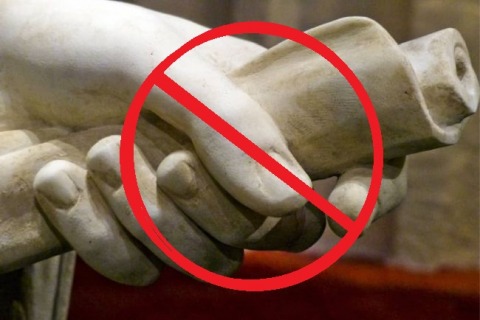
A number of conservative writers have criticized so-called sanctuary cities for – they say -- resurrecting the old “nullification” doctrine which over the years has been used to justify a variety of things, including the rebellion of the South in the Civil War. I agree that the rebellion was bad, and I agree that the sanctuary cities haven’t a leg to stand on. But it would be more accurate to say that the sanctuary cities want to resurrect anarchy than that they want to resurrect nullification. Nullification doctrine is different, and it is more subtle than it looks.
What is nullification, anyway?
During the first few decades of the republic, a lot of intelligent people were concerned that the federal government would become a tyrant, aggrandizing itself at the expense of the states. We have checks and balances inside the federal government; proponents of nullification wanted the states to have a check against the federal government, for our government is a “United States” rather than a single state. This is not a bad idea in itself.
The argument for the nullification power is intriguing. We can put it in question-and-answer form.
- Who knows best what a document means? Nullification proponents replied: Its authors know best what it means.
- Who then are the Constitution's real authors? Nullification proponents replied: Its real authors are those who make it the constitution – who convert it from a mere proposal into an instrument with legal force.
- Who then made it the Constitution? Nullification proponents replied: Not those who wrote it, but those who gave it legal force by ratifying it.
- Who then ratified it? Nullification proponents replied: The states did.
- Who then knows best what the Constitution means? Nullification proponents replied: The states do.
From this, they concluded that a state may invalidate a federal law which it deemed unconstitutional, refusing to allow it to be enforced within the state’s territory. This was usually called nullification, sometimes interposition. I will explain in a few moments why their conclusion doesn’t follow, but first let’s take a step back and look at the problem from another angle.
George Washington thought the invalidation of federal laws by individual states was a dreadful idea because it would "dissolve the union or produce coercion.” He and many others thought not just that federal laws are supreme within their proper sphere (which the Constitution affirms), but also that the federal government should have sole authority to determine the constitutionality of its own laws.
But some of the other Founders of the republic thought allowing the federal government the authority to determine the constitutionality of its own laws would be like letting the fox guard the henhouse. In 1798, alarmed by the Alien and Sedition Acts, both Thomas Jefferson, in Kentucky, and James Madison, in Virginia, penned resolutions declaring that individual states had the authority to declare a federal law unconstitutional and refuse to allow its enforcement in their respective territories.
Jefferson and Madison were right to oppose the Alien and Sedition Acts, which among other things violated the First Amendment guarantee of freedom of speech and press by declaring punishments for “false, scandalous, and malicious” criticisms of the government. Guess who would decide what counted as false, scandalous, or malicious? The government itself. Sound familiar?
On the other hand, George Washington was right to think that Jefferson and Madison’s remedy went much, much too far, because it would pose the federal government with a terrible dilemma. The government could either use force to compel dissenting states to obey – or else it consent to its own dissolution.
An excellent case can be made that the states ought to have some kind of constitutional check on an overbearing federal government. But consider: The constitution did not become a constitution just in those states which ratified it. Once it had two-thirds approval – nine of the original thirteen -- it became the constitution of all of them. So what we should conclude from the five bullet points isn’t that any state, all by itself, should be able to decide whether federal law is really law within its territory. It would make more sense to say that a two-thirds majority of the states could do so. In 1987, precisely this suggestion was made by former New Hampshire governor John Sununu. It would require a Constitutional amendment.
So called sanctuary cities do not claim the measured sort of nullification power which Mr. Sununu suggested. They don’t even claim the more extreme version of the nullification power which Jefferson and Madison proposed. What they claim is that not just any state, but any locality may invalidate federal laws within its territory. This isn’t about the form of the federal union. It is a rejection of federal union.
Even leaving aside the threat of lawlessness and chaos, by what possible constitutional theory could cities, not states, claim such power? The nullification theory bases its claim on the role the states had in ratifying the Constitution. But cities had no share in that at all.
So the critics are right to repudiate the claims of the sanctuary cities, but their arguments need some tweaking. What the sanctuary cities propose isn’t your great-great-great-great grandmother’s version of nullification. It is something much different, and much worse.